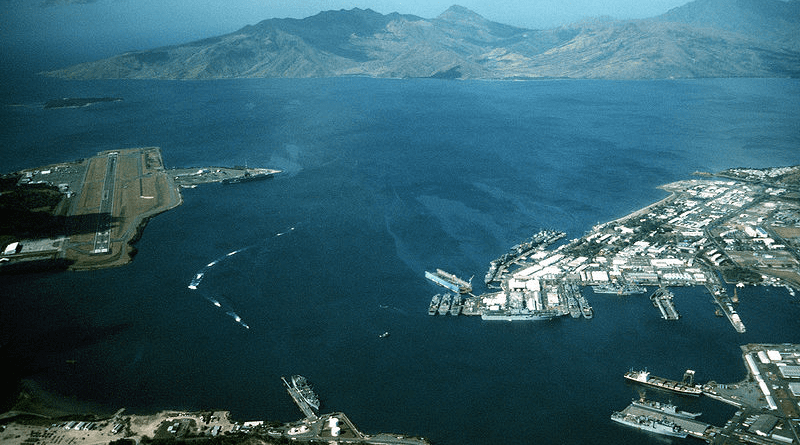American Firm Buys Philippine Shipyard On Ex-US Subic Base By South China Sea
By BenarNews
By Shailaja Neelakantan
A private American firm has purchased a strategic shipyard on a former U.S. navy base in the Philippines by the South China Sea, U.S. and Filipino officials said, ending speculation about possible Chinese investment in the project.
This week the Filipino envoy to the United States thanked American officials for their efforts towards the agreement with New York-based private equity firm Cerberus Capital Management, saying that U.S. involvement in the shipyard at Subic Bay would enhance the security of the Philippines and Southeast Asia.
“The completion of the Subic Bay shipyard will redound to benefits for the country, bring jobs to the local communities, increase economic activity, and at the same fortify our strategic security measures,” Ambassador Jose Manuel G. Romualdez said during a diplomatic reception held Tuesday at the Philippine Embassy to celebrate the agreement and Manila-Washington relations, according to a statement from the embassy on Thursday.
“Working with the United States on this project will help ensure that we are able to protect … interests not only for our country but the whole region,” he added.
Ely Ratner, the U.S. assistant secretary of defense for Indo-Pacific Security Affairs, said the acquisition was an “important example of U.S.-Philippine public-private partnership.”
“Great to see the completion of the acquisition of Hanjin shipyard in Subic Bay by a U.S.-based firm,” he tweeted Wednesday.
Neither Ratner nor Romualdez provided details about the agreement, although Reuters reported last month that Cerberus would acquire the shipyard for U.S. $300 million. On Friday, the investment firm did not immediately respond to a BenarNews call and email for comment.
Philippine Foreign Secretary Teodoro Locsin Jr. said the agreement with Cerberus was “the biggest public-private partnership in the 75-year history of Philippine-U.S. relations.”
Manila had been studying the prospect of offering the shipyard operations to players from the U.S., Australia, South Korea and Japan – countries that are all considered as allies by the Philippines – the defense chief Delfin Lorenzana had said in January 2019 after the shipyard’s then operator, South Korea’s Hanjin Heavy Industries and Construction, filed for bankruptcy. It had defaulted on $1.3 billion in loans, according to Reuters.
But amid reports that a state-run Chinese company was among two mainland firms that had expressed interest in taking over the site of the former U.S. naval base, Lorenzana had said back then that he had had discussions with other top officials about taking over the shipyard lest it falls into the hands of the Chinese who could use it as a regional foothold amid contentious South China Sea claims.
Earlier in the week, the Philippine defense chief was in Washington where he met with Lloyd Austin, his U.S. counterpart, at the Pentagon to discuss ways to deepen cooperation under the alliance between the two countries.
Beijing claims most of the South China Sea, but its sweeping claims are disputed by other regional countries, including the Philippines. In 2016, an international tribunal ruled for the Philippines in its case against China regarding territorial claims, but Beijing refused to accept the ruling.
China continues to intrude into other claimant nations’ exclusive economic zones in the South China Sea and harass other countries when they are exploring resources in these waters. This week, Manila said it had decided to suspend all exploration activities within the disputed areas in South China Sea, under what an analyst described as “coercion” from China. The Filipinos call the disputed waterway the West Philippine Sea.
Washington had two of its largest overseas military installations, Subic Bay Naval Base and Clark Air Base, in the Philippines until the early 1990s. They were shut down after the Philippine Congress voted to end their lease at the end of the Cold War. After the U.S. forces vacated, both sites were transformed into free ports and investment zones.Recently, Romualdez said that President Rodrigo Duterte was willing to allow American forces to use these bases and facilities if the crisis in Ukraine stemming from the Russian invasion spread to Asia, although Manila would not deploy troops in such a potential confrontation.

